This interview is part of our interview series, where we curate stories of regular people that decided to design a life they love. (click here to learn more).
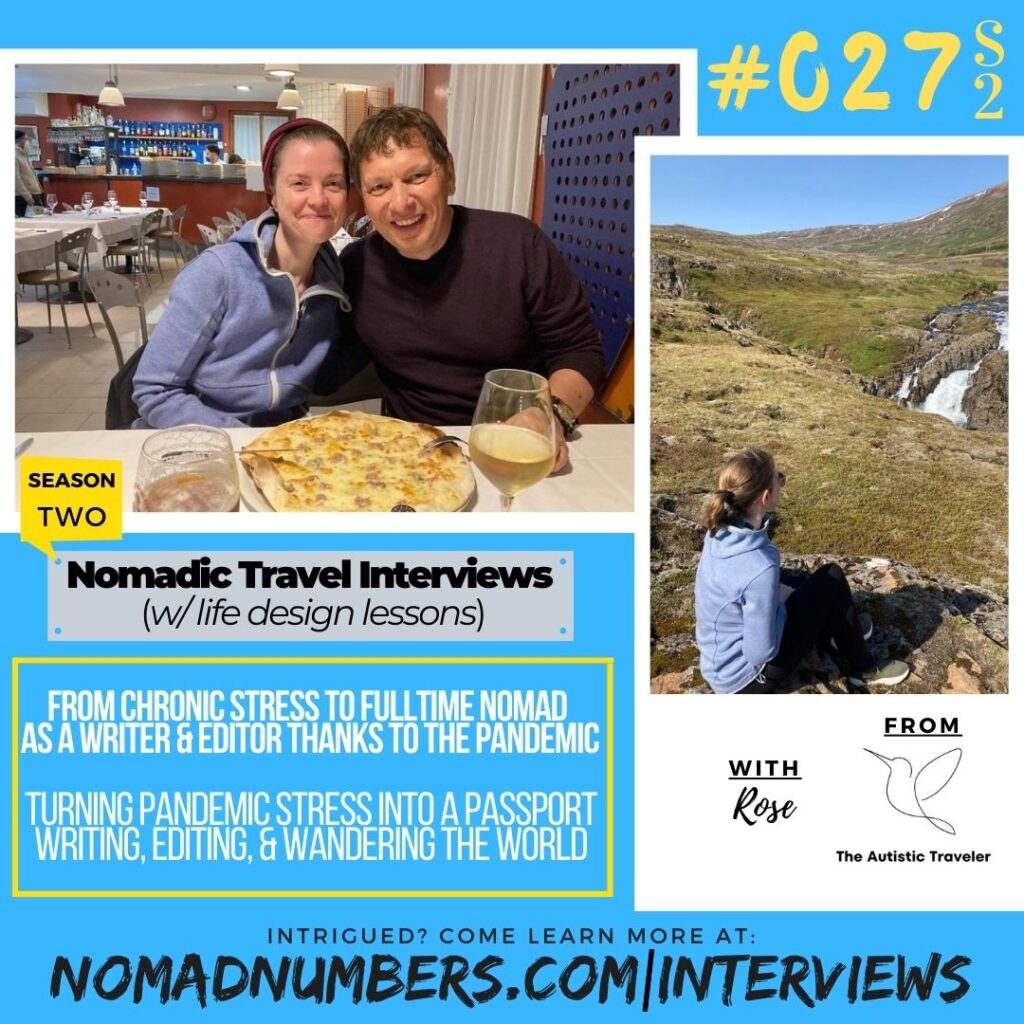
Rose from The Autistic Traveler
Some links to the products mentioned below are affiliate links, meaning that if you click and make a purchase, we (Nomad Numbers) may receive a commission at no additional cost to you. For more information please review our disclaimer page.
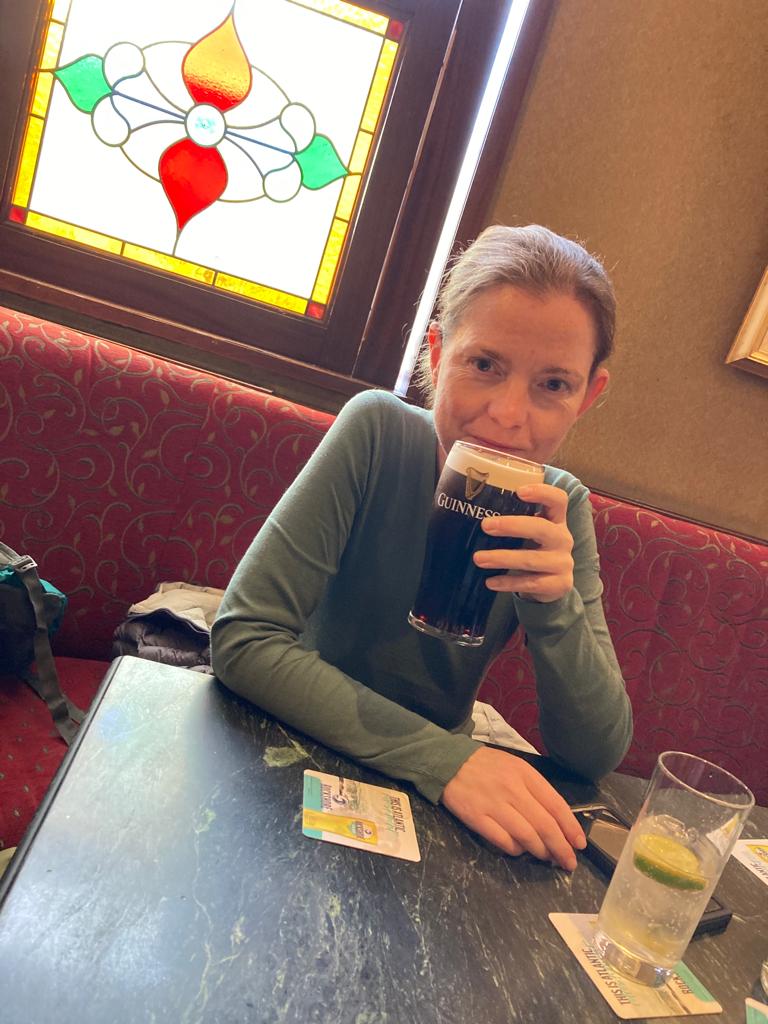
1. Can you introduce yourself?
My partner Seva (56) and I (45) have been full-time nomads since late 2019. Seva grew up in Ukraine, and I grew up in Alaska in the United States. We both traveled extensively before 2019, but never really considered the possibility of doing it full-time. He is a language professor (very handy on our travels!), and I was a political science professor before chronic burnout and a desire to write fueled my decision to live a different life.
After leaving my job, I began a few house sits on my own. The first long one was in Wales in November 2019, where I completely fell in love with the endless possibilities of house sitting and long-term travel. Seva joined me in Cyprus in 2019, and we continued on our travels until…the pandemic hit. We found ourselves in the enviable position of lockdown on the coast of Portugal, in an apartment overlooking the beach. Seva’s job became fully remote, and we had plenty of time to contemplate the future. As our visa clock ran down, we contemplated flying back to the United States, even though the US had so many more cases than Portugal. At that moment, Seva’s long-held wish to leave the United States had rubbed off on me.
I turned to him and said, “What if we didn’t go ‘home’?”
And that was it.
2. What does a typical day in your life look like for you today? How does it differ from your life before?
Whenever we encounter a “problem” now, we laugh and say, “Just another rough day at the office.” It’s so true—any challenges we face now are nothing compared to the chronic stress we used to have. In my old life, it felt like a series of invisible rubber bands were wrapped around me, giving me the illusion that I could stretch this way and that. But if I stretched too far, they’d snap back at me. Those rubber bands are gone now, and I sometimes must remind myself they aren’t there anymore.
In my old life, I’d get up very early to teach a 7:45 a.m. class and then another at 10:30, followed by a day of meetings and then more meetings in the evening for community organizing. On my non-teaching days, I’d cram in more meetings, endless email, teaching prep, research and writing, and more bureaucracy. I’d get up at 5 and would sometimes be home by 10 or 11 p.m. before collapsing into bed. But the schedule was less challenging than the politics of the university. Let’s just say that although I love working with students, the university can often be a highly toxic environment.
When fibromyalgia hit (which I now know was severe autistic burnout), I had to completely withdraw from everything, trying to teach and take meetings online before that was acceptable at the university. I knew something had to change, and had meanwhile found fiction writing and publishing as a creative outlet that eased my stress and brought me much joy.
I sought a trusted coach, and we worked together on how to take what I loved about my job and writing to make that into a life of intention.
I still get up very early, but that’s by choice. In between multiple coffee breaks and a long walk, I work on writing or editing projects for the day. Then I go for another walk with Seva and the dogs we might be house-sitting, have lunch, a snooze, and then go out again or do light planning work or admin. Seva teaches his online courses in the afternoon/early evening. After dinner, we’ll go for another walk and will watch something for an hour. Then it’s off to bed.
It’s a simple life, but travel makes everything an adventure from grocery shopping to planning our next sit. As an autistic person, anchoring rituals keep my nervous system calm, while my supercharged sensory system brings joy from a walk on the beach. The normal inside state of my body now is peaceful rather than inflamed.
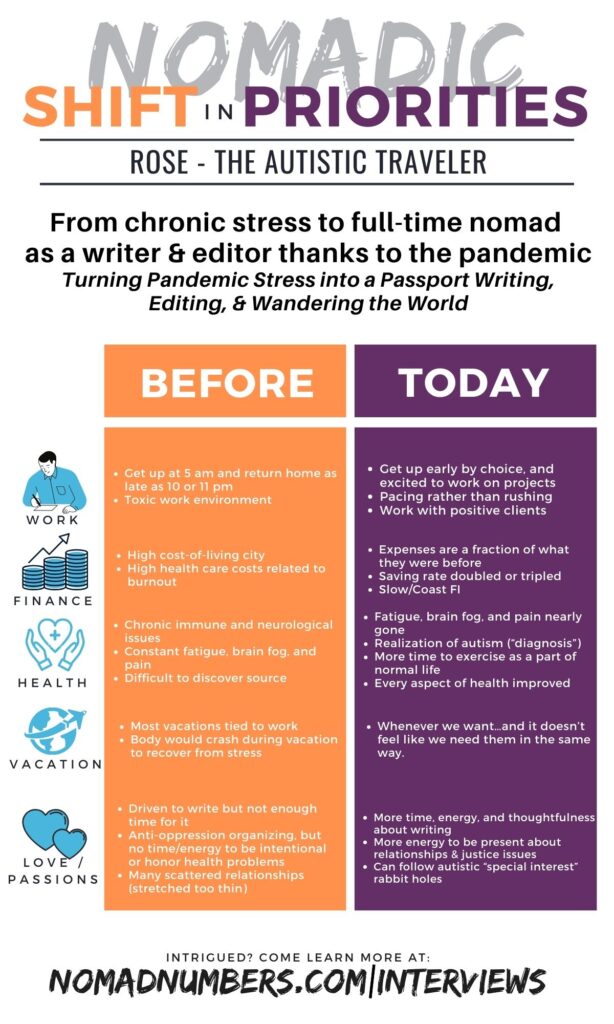
Life design journey
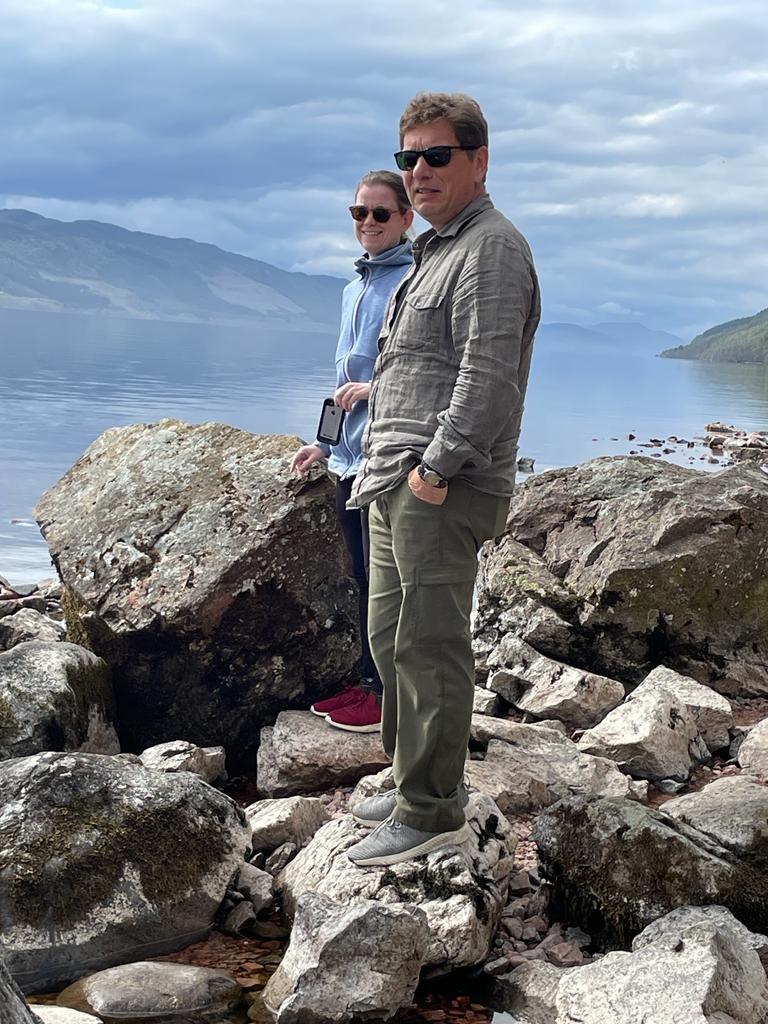
3. What inflection point led you to decide to change your life trajectory?
Four major points:
- Kerry Ann Rockquemore’s (former professor and financial independence inspiration) question about being a professor: Do I really want to do this?
- Discovering fiction writing and new ways of making money.
- Chronic health issues and recurring burnout. It was only after making the decision to go nomadic that I realized I was autistic and pursued a diagnosis. It turns out that my fibromyalgia diagnosis was probably autistic burnout.
I doubt I would have ever realized this had I stayed in my old life. Though all autistic people are different, my need for autonomy, setting my own pace, love of animals and nature, and time to recharge from busy environments made this new life a much better fit. My sensory system (e.g. sight, smell, hearing, etc.) is always on high alert and will lead to a full meltdown or shutdown (like a computer turning off) if I don’t take care of it.
It seems strange to many people that it’s easier to self-regulate through slow travel rather than by staying in one spot–but it is. Also, being away from my home country frees me from following American “neurotypical” social norms. Autistic people are not actually socially awkward–we just appear so because we have to follow neurotypical ways of communicating. When you travel, you’re always respectful of local cultures and customs, but no one expects you to be able to follow them perfectly. It’s very freeing. - Lockdown in Portugal. Realizing we didn’t need to go back to the United States.
4. What were some of the limiting beliefs that hold you back initially?
- Unlike other professions, returning to academia is very difficult. You can’t quit being a tenured professor and then just find another tenured job if your experiment doesn’t work out. That can keep a lot of professors feeling trapped, unless they have a clear practitioner path open to them (like psychologists going into private practice).
- Another limiting belief was stories I had about the cost of travel. Despite being a frequent traveler, I was amazed to discover that traveling full-time is not only cheaper than staying at home but also helps save money.
- The narrative about how travel is “running away from your problems” was yet another limiting belief. Strangely enough, I found the opposite: An easy way to run away from your problems is to live on a conveyor belt of societal expectations without ever really questioning whether it’s fulfilling. In many ways, I thought I was living an unconventional life before (and I was!), but it turns out those internalized norms were even deeper than I’d imagined.
- Another limiting belief was around impact and community. I felt like I’d be leaving people behind, and that full-time travel was selfish. This is a highly complex limiting belief, but ultimately this lifestyle helps me be healthier and more present in important relationships, while being less reactive to crises. Besides, my body had simply said ‘no’ (see Gabor Maté’s When the Body Says No), so it wasn’t like I could continue living like that, anyway. I now have a better sense of life being lived in seasons, so I don’t have to judge what I’m doing now based on what I did before. They’re separate but connected stories.
5. What did you do to prepare the transition to this new destination and how did you do it?
Unlike most nomads, our journey was a happy accident! Although we were on a kind of sabbatical when the pandemic hit in the Azores, we had no plans to become full-time nomads. Those first lockdown months when Seva’s job became fully remote made us realize we could make this a full-time lifestyle, at least for the time being.
When things began to open up, and we house-sat again (and then were in lockdown again in the UK), we realized how happy we were living out of a backpack. In early 2022, Seva sold the apartment in Seattle, and we had friends help us get rid of everything, minus a few boxes stored with family. Though it was painful to do this remotely, it turned out to be much easier just to let things go. It worked well for us since we were moving towards minimalism before, but it may not work for everyone.
6. Once on the journey, what were some of the biggest wins you realized? What were the challenges you had to face along the way?
Biggest wins:
- Doubling my net worth after becoming a nomad.
- Living on a quarter of what I did before.
- Working part-time and in a way that suits me.
- Understanding myself and our relationship in a different way.
- Getting to see so many new and wonderful places through house sitting—and living in beautiful homes.
- Meeting amazing hosts and pets.
- Focusing on being present for a few relationships rather than spreading myself thin.
- Becoming so much healthier in every sense of the word.
- Realizing I’m autistic.
Biggest challenges:
- Sensory overload issues both in housesitting and travel (see autism)
- Working together in the same space with my partner.
- Leaving house sits (logistics and cleaning).
- Constantly changing plans during two years of the pandemic.
- The uncertainty that can come with house-sitting (which is also the biggest gift of house sitting).
- Making sure our house sits aren’t socially isolating—especially for my partner.
7. How long did/will it take to reach the destination? Any advice to make the journey as enjoyable as possible?
Making peace with uncertainty and befriending serendipity. Uncertainty is part of life, and living a conventional life can make it seem like death or uncertainty can somehow be controlled. I know this sounds morbid, but making peace with the uncertainty of life (e.g., death!) makes this journey so much more fun.
8. What did the people around you (friends/family/colleagues…) think of your plan to take on this new life?
Most people still can’t really wrap their heads around how we live—and we certainly have a hard time explaining it. Our loved ones are very supportive, but they often ask if we will make a place our permanent home. The idea that our loved ones will disapprove full-time can be a limiting belief in itself, but you soon realize that you can disagree with them and they’ll still love you (and if not, that’s probably helpful to know!).
Cost of living
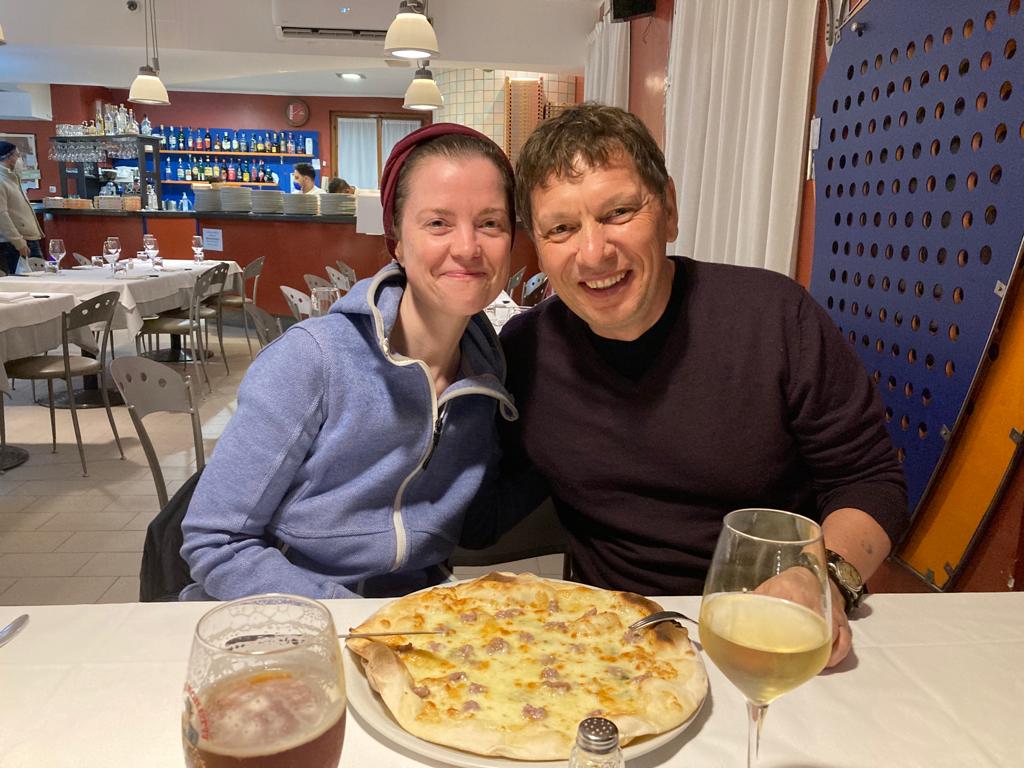
9. How much yearly expense did you have before and after this change in lifestyle?
We used to live in Seattle, where our living expenses were very high, especially to keep up with our jobs (see Your Money or Your Life). Though I didn’t track my expenses then, I spent around $40,000-50,000 a year (for myself, not including Seva). Now, I average around $12,000 a year, not including self-employment expenses/taxes. Even more surprising was how much I’ve saved since leaving my ‘steady’ job. My net worth has doubled since leaving Seattle, even though I work a fraction of what I did before (and by “work” I mean time/labor=money equation, not ‘fun’ work like writing).
Note: This is my budget only. We keep our expenses separate, although I obviously benefit from spending less on accommodation when we do have a rental or stay in a hotel (but the majority of our time is house-sitting). The averages are from daily expense tracking across 2021 and 2022.
| Category | Description | Cost per person per month |
|---|---|---|
| Accommodation | Anything you pay toward keeping a roof over your head (ie. rent, internet, water, utilities…) | $215 |
| Groceries | Anything related to the groceries you get to cook at home (+ alcohol) | $196 |
| Dining out / Take-out | Anything related to what you spend when dining outside of your home. | $21 |
| Activities / Entertainment | Anything you pay related to ‘fun money’ (ie. park fees, outdoor activity, AirBnB experience…) | $1 |
| Health Care | Any cost related to treatment you are receiving on a given location. | $84 |
| International Health / Travel Insurance | This is health.travel insurance that your purchase to get you covered outside of your home country | $76 |
| Local Transportation | Anything related to transportation within the boundary of the location you are staying at. | $7 |
| International Transportation | Anything related to transportation to go from one location to another. | $84 |
| Visa / House sitting annual fees | Any cost related to a visa to stay in a given country. | $30 |
| Clothing | Any cost related to maintaining a wardrobe | $52 |
| Giving & Gifts | Large enough to deserve its own category | $27 |
| Living expenses | Communication, toiletries, and miscellaneous | $24 |
| TOTALS | Monthly total Yearly total | $984 / month $11,808 / year |
10. What strategies have you used to reduce your expenses? And what strategies have you used to fund your lifestyle?
Without downplaying the seriousness of money given my relatively privileged status relative to my home country and on a global scale, I now approach finances as a game. I tend to take things too seriously, so lightening this has made this process more enjoyable and also has financial benefits.
1. Expense tracking: I used the now-defunct Trail Wallet app to track expenses, and now use Tripcoin (I look forward to the day that I can use the Nomad Purse app on my iPhone). Not only does expense tracking help keep you honest about spending, but it also frees up precious brain space to remember other things. Although I earn less now (by choice), I have fewer money worries because I know exactly what I’m spending. I also spend less because the act of inputting it gives me a tiny moment’s pause to decide whether it’s the right choice. Some people might find it constraining, but I find it freeing.
2. House-sitting: House-sitting accounts for the largest savings in our budget. Because we’re full-time house sitters, more expensive countries (like the UK or Ireland) ironically become cheaper than other countries (like Montenegro or Albania), where few house sits are available. Paying nothing is always cheaper than the cheapest rent. Also, slow travel means we’re usually not trying typical tourist activities. Because we both work online—and one of us has a lot of online calls—it also means we can stay in larger places where we can work without disrupting each other. The other major benefits are caring for lovely pets, meeting amazing hosts, and feeling like a part of a smaller community.
3. Travel hacking – This includes credit card bonuses, buying through points portals online, getting local rewards cards, and researching local and national deals. We try to avoid flying when we can, so most of our points are spent on overnight accommodation between housesits (even when it’s not the most efficient use of points), or saving for a major flight. If we have a big purchase like a new laptop, we buy it through a points portal—it doesn’t affect the price. Because we spend a lot of time in a particular region or country—and also plan on returning for the same house-sits—I often research local deals, such as buying local transportation cards, or finding other such deals. It’s a fun way to get to know more about the place you’re staying, and it often has a financial payoff.
4. Research – I love research, so only try this if you have that kind of brain! When you’re putting together your itinerary, it’s easy to think that because x destination is only 50 miles from your planned y destination it will be cheaper to go there than one that’s 100 miles away. For example, it can be cheaper and less time-consuming to take the train from London to Edinburgh than from London to a cute village in the Cotswolds, which is much closer (because you end up taking a bus and a taxi). Researching this before you commit to a house sit or destination will not only save you money but also a logistical headache.
5. Passive income – We take a throw-the-spaghetti-against-the-wall approach to passive income. I have a small but steady stream from self-publishing mysteries, but that just gets reinvested in the publishing process. I also earn small amounts from Medium and Substack. I’m always trying something new to generate passive income—it’s become another hobby.
6. Knowing what makes me happy – This may seem odd to include on this list, but full-time travel frees you from an auto-pilot life you might have been living before. This reduces expenses in two ways. First, I used to buy ‘treats’ to compensate for stress and overwork. This could be anything from fancy coffee to retail therapy. I still enjoy fancy coffee and thrift store shopping, but I don’t need them in the way I used to—as a sort of self-soothing technique to deal with stress and chaos. This isn’t a judgment at all, because we do what we need to do to soothe ourselves! It’s just that I’ve removed that chronic stress, so it truly feels like a treat now when I do it. Second, I used to default to general norms about what should make me happy, like spending money at a restaurant or bar. Or even things like “I’ll only be in this city once, so I should really go to x museum.” Again, no judgment here—if museums are your thing, then go for it. The point is that long-term travel helps you experiment with what really makes you happy, rather than a list of ‘shoulds’ lurking in your unconscious mind. The act of experimenting with this makes it an adventure in itself. Do I still fall prey to buying things I don’t need? Of course. But it happens less, and I seem to learn from my mistakes more quickly.
Lessons, tips & advices
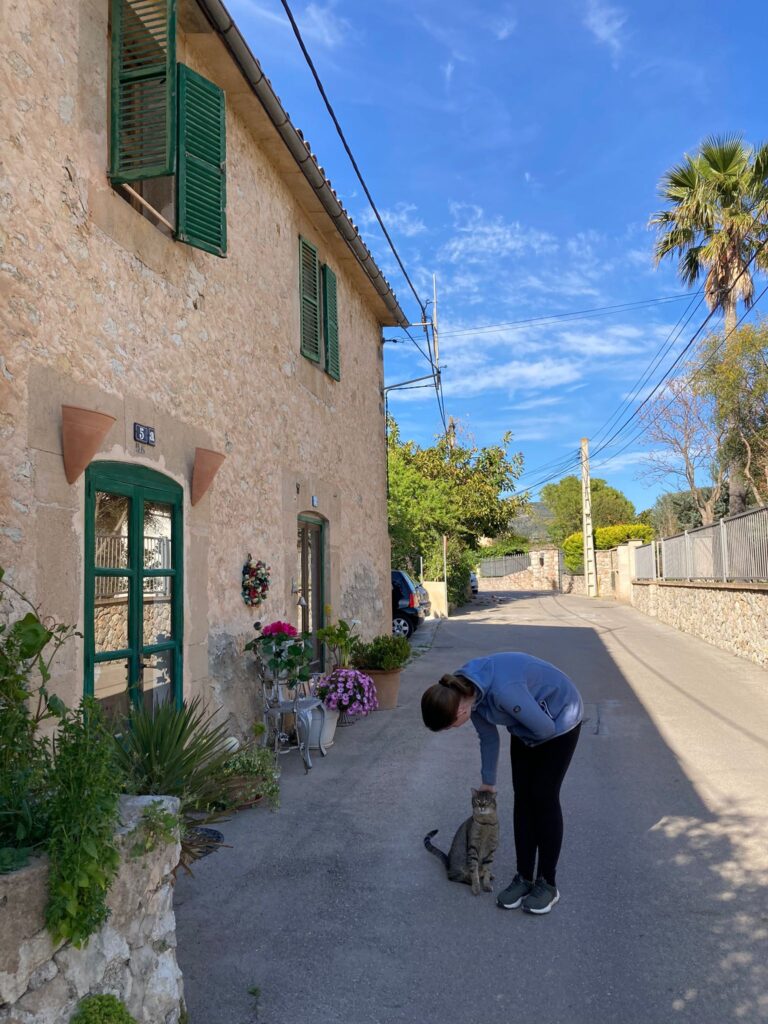
11. If you had to do it again, what would you do differently?
We would have become nomads earlier. I have no regrets about my life before, but I do think leaving maybe four or five years earlier—before I hit total burnout—would have been great.
12. What advice do you have for others who are considering going through a life design exercise?
Martha Beck’s “ideal day” exercise is fantastic. I also recommend Gay Hendrick’s book, The Big Leap, which really helps you understand core wounds and whether you’re actually operating in your zone of genius (as opposed to your zone of excellence).
Because it’s lonely to contemplate this when you’re in your 9-5, podcasts can help. Listen to career-change, lifestyle design, side-hustle, spiritual, financial independence, life-coaching, and unconventional podcasts, if that’s your thing. Although books and videos were helpful, something about hearing other people’s real stories helped me keep going when I had doubts.
13. What is one resource (blog, podcast, book beside your own) you recommend for those that want to design their own life?
A Purple Life because she has a light-hearted but thorough approach to financial independence and nomad life. Also, Jacob Lund Fisker’s Early Retirement Extreme (and blog and podcast appearances) is such a great reminder of how little we need to be engaged, happy, and fulfilled.
Looking ahead
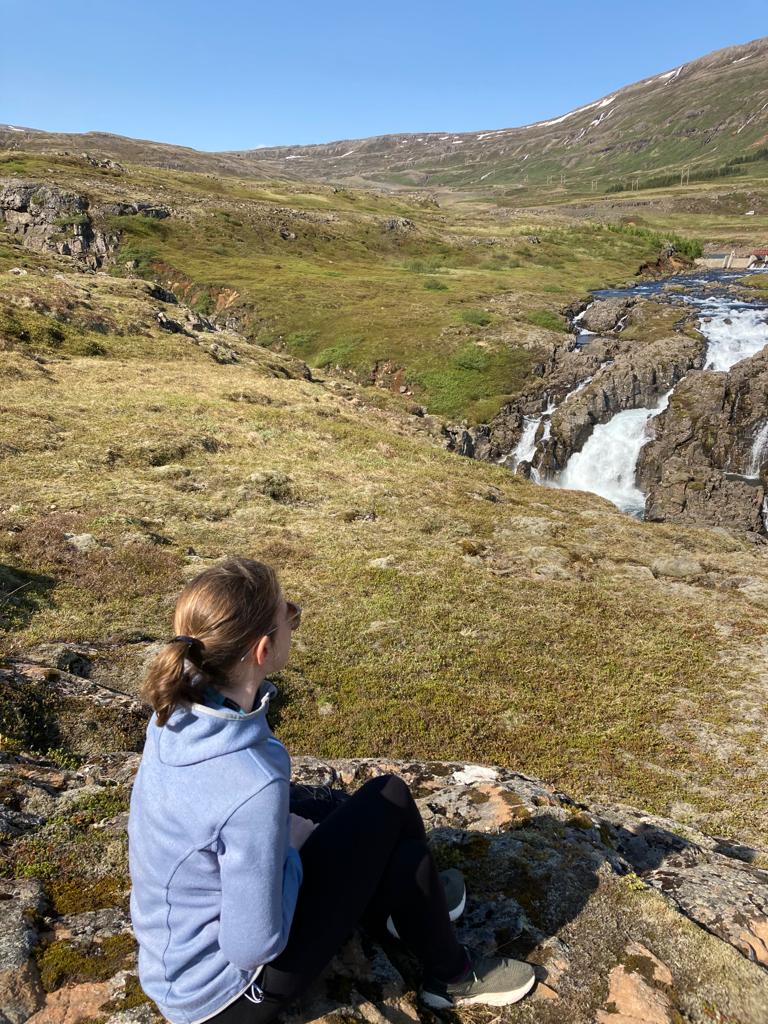
14. What is next for you?
More adventures. I’m a planner by nature, so I’ve learned to plan my ‘work’ and create rituals that are portable no matter where we might be. We’re on a Coast FI journey and will keep teaching, coaching, and writing even after reaching full FI because it’s enjoyable and a way to serve others.
Thank you so much Rose for sharing your life journey with us. This interview is packed with so many good nuggets of wisdom and tactics that I tried to highlight along the way. Excited for your next adventures and hopefully our path can cross at some point!
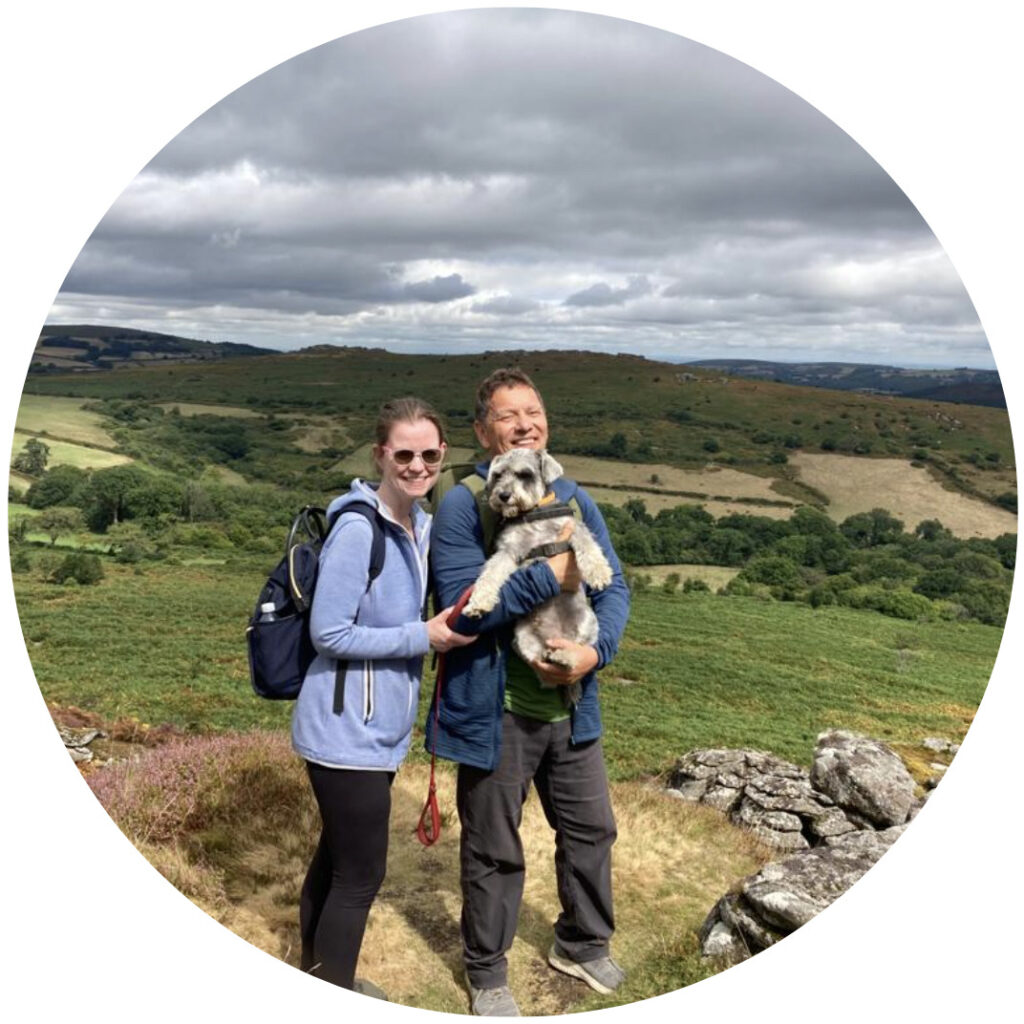
If you want to know more about Rose, The Autistic Traveler, you can find her on the following platforms:
- Blog: The Autistic Traveler
- Newsletter: Substack
Rapid-fire questions
We like ending every interview by asking some fun rapid-fire questions to our guests
| What is your superpower & why? | Being Autistic means I often see or hear things everyone else misses. |
| What is your favorite travel destination & why? | Only one?! Albania and Ireland tie for the same reason: the most genuinely friendly people I’ve ever met. |
| What is the best Amazon (or online) purchase you made this past year? (Provide a link to Amazon or the product page) | Lately, sensory issues around cleanliness have been bothering me, so I bought a silk sleep sack (in a brick-and-mortar store), a small silk pillowcase (I stuff with my down jacket), and a Trippy down camp blanket online (bought online in Germany). It’s handy when you’re in a sketchy hotel: no need to deal with questionable bedding. |
| What is the best Airbnb (or similar) you ever lived in and why? | Our best Airbnb was in Tuhelj, Croatia. The host was wonderful, and we befriended the housekeeper who actually made sure we were vaccinated so we could travel (because our visa was up). We wouldn’t have been vaccinated without her help. The cabin itself was set in a beautiful cozy village with the friendliest tiny grocery store and a thermal bath three miles away. |
| What’s something you can never live without? | Materially, it would be coffee. Spiritually, it would be a sense of wonder. |
| What’s the best piece of advice you’ve received? | It’s cliched, but it’s Mary Oliver’s question (from “The Summer Day” poem): Tell me, what is it you plan to do with your one wild and precious life? |
Our Bottom Line
Here are the main lessons we took away from this interview with Rose – The Autistic Traveler.
- Lesson 1 – “The narrative about how travel is “running away from your problems” – According to Rose, getting outside of your comfort zone by leaving your comfortable life is what leaving an unconventional life means, rather than the opposite.
- Lesson 2 – Some of the big wins of becoming nomads for Rose included doubling her net worth, working part-time in a way to suit her, understanding herself and her relationship in a different way or focusing on a few relationships rather than many.
- Lesson 3 – “Knowing what makes me happy” – When it comes to reducing expenses, Rose like to also focus on what makes her happy which is significantly different when you live a life of your own that is less stressful that a regular 9-5. She explained that she liked to enjoy fancy treats but these are not needed as much now that she lives a happier, less stressful life.
- Lesson 4 – You can pace your life at whatever tempo works for you – Because Rose is nomadic, she has great control over how fast / often she can move as well as how much time she can spend on her work vs her other occupations. Something that many non nomadic people usually don’t have great control over.
Sometimes we need to hear about others making unconventional decisions before we can have the confidence to make our own. If you have (or are on a path to) an unconventional journey to improve your life that has a nomadic component to it and are interested to share it, please reach out to us as we would love to consider your story for our blog.
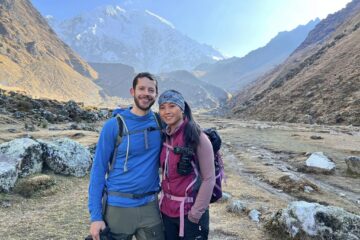
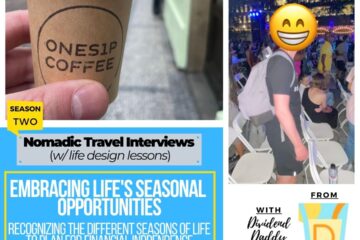
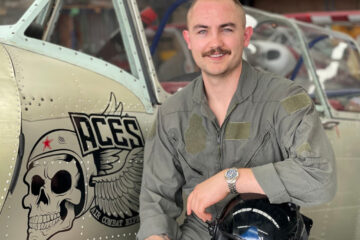
4 Comments
Darrell · September 11, 2023 at 12:21 pm
I enjoyed reading Rose’s story. I don’t have the physical limitations but I can appreciate the complexity of having to learn what is really limiting versus what I thought was limiting me.
Rose · November 28, 2023 at 5:18 am
Thank you, Darrell! Well put.
Rose · September 11, 2023 at 2:48 pm
Thank you for the interview! I’m always impressed by how much I learn from these–your questions and responses are so thoughtful and insightful.
Mr. Nomad Numbers · September 18, 2023 at 2:50 pm
Thank you for sharing your story with our community!